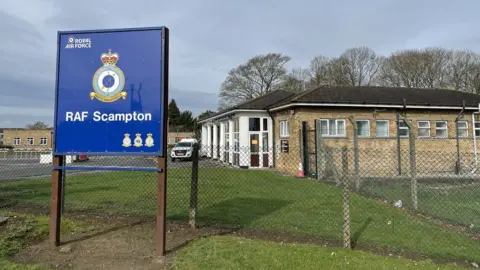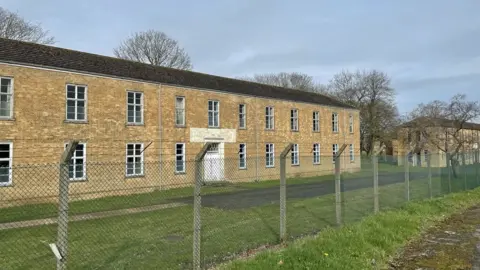RAF Scampton: Council in Home Office legal battle over airfield asylum site
 PA Media
PA MediaA council has launched legal action against the Home Office to challenge the decision to use a local RAF station for asylum accommodation.
The government said it was to use RAF Scampton in Lincolnshire as a site for up to 2,000 asylum seekers.
West Lindsey District Council said it felt the site was not "appropriate" and it would affect plans for a £300m regeneration project.
The Home Office has been contacted for comment.
The local authority insisted there were a "significant number of barriers" to housing asylum seekers at the site.
It said these included "significant contamination" from previous site uses that would require "thorough remediation".
The body accused the Home Office of failing to provide a satisfactory response to questions it had raised, and said it has therefore commenced legal action to challenge the government department's decision.
 PA Media
PA MediaSally Grindrod-Smith, the council's director of planning, regeneration and communities, said the move would cause "irretrievable damage" to an investment opportunity it was working on.
A deal had been agreed between West Lindsey District Council and the Ministry of Defence to purchase the site, it previously said.
The council said it also hoped to see work to "preserve and enhance the heritage of the site", which was known for its involvement in the Dambusters raid and most recently as the base for the Red Arrows.
 PA Media
PA MediaMs Grindrod-Smith said there was also a concern the Home Office did not have "the appropriate planning permission" for asylum accommodation.
"The council has therefore issued a letter before action, sent in accordance with the Pre-Action Protocol for Judicial Review, which requires the Home Secretary to respond by no later than 16:00 on Thursday 6 April 2023," she added.
According to a document published by the government following its decision, the site would accommodate "single adult male" asylum seekers.
It also said would use a "phased approach" - starting with moving 200 people on site before increasing to 2,000 over time.

Follow BBC East Yorkshire and Lincolnshire on Facebook, Twitter, and Instagram. Send your story ideas to [email protected].
